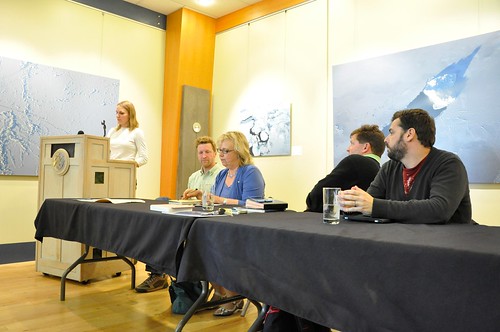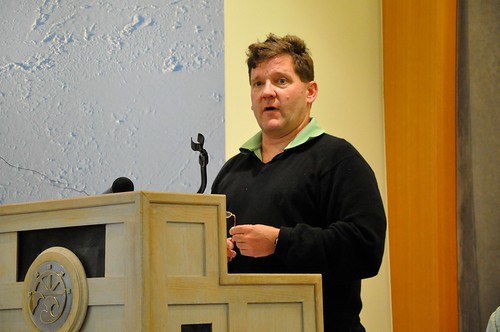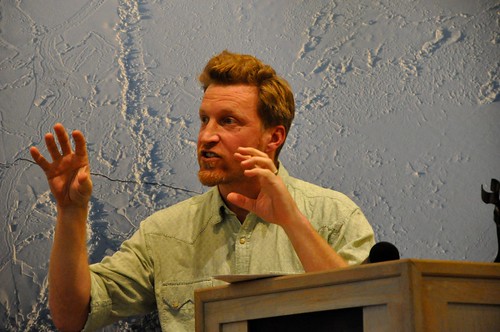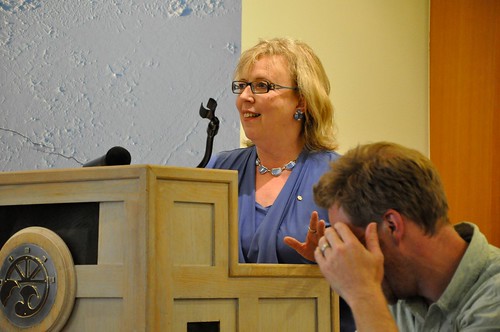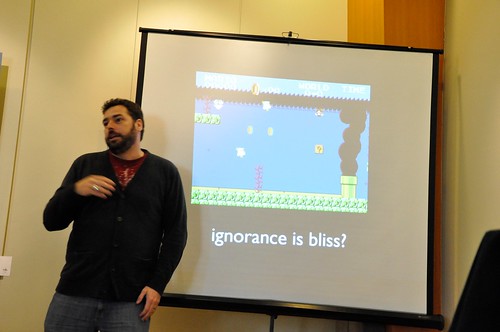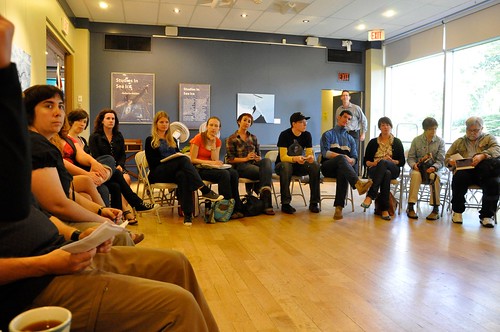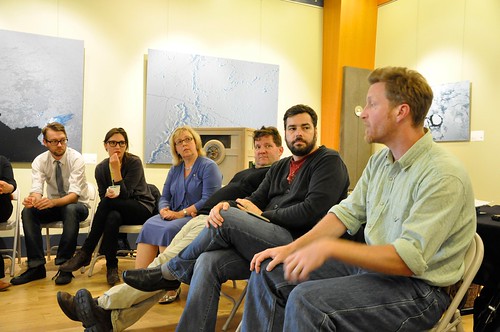I attended Making Sense of the Oil Slick discussion panel at the BC Marine Museum last night, and found that there is a lot of stuff that a lot of people simply don’t know! (or maybe people just don’t want to know?)
The panel consisted of:
– Elizabeth May, Leader of the Green Party of Canada
– Professor Geoff Mann, Dogwood Initiative / Department of Geography, Simon Fraser University
– Professor Kurt Andrew Grimm, Department of Earth and Ocean Sciences, University of British Columbia
– Robert Scales, Technology and Communication Strategist*
The talk started off with Prof. Kurt Grimm, speaking from a scientific and religious angle, saying that science has gone crazy and this problem is bigger than we are.We need to stop pointing the fingers at other, because the problem here is starting with us, with our addiction to fossil fuels!
Prof. Geoff Mann followed with a political policies discussion and had some very interesting things to say around British Columbia’s current situation and the risks of the potential plan to begin offshore drilling right here at home. He discussed ways to stop, or at least make it more difficult for companies to drill for oil off our coast. He told the group that the current tanker ban off out coast is unenforced and that our laws are generally too relaxed around the subject. The most effective environmental tool British Columbia has, he said, is our First Nations and their ability to stop such things from happening in our province and country. The 28 Nations have banded together to oppose Enbridge’s 1,000-kilometre pipeline stretching from the oil patch north of Edmonton to Kitimaat, B.C.
“We will protect ourselves and the interests of future generations with everything we have because one major oil spill on the coast of British Columbia would wipe us out,” Gerald Amos, director of the Coastal First Nations, said in a statement.
Up next in the discussion was Elizabeth May, Leader of the Green Party of Canada. She continued Geoff Mann’s conversation by talking more about government policies saying that Canada’s oil and gas regulations are a joke. One major example is the bill that was passed just yesterday around environmental issues.
It is probably best described by quoting from Elizabeth’s blog, “the 2009 Budget Implementation Bill was used to gut the Navigable Water Protection Act (NWPA). The NWPA had been cornerstone environmental legislation since 1867, but the Conservative government decided that an objective definition of “navigable” could be replaced with “anything the Minister of Transport thinks it is.”
“This year is worse. The Canadian Environmental Assessment Act (CEAA) is clearly in the Harper governments cross-hairs. First, the budget text (as reported) included the unprecedented move to take energy projects away from the CEAA and assign environmental assessment for energy projects to the National Energy Board or the Canadian Nuclear Safety Commission. Now, the details of the 2010 Budget Implementation Bill have been released, and, you guessed it, it gets worse.
“The new amendments were clearly designed to evade the implications of the recent Supreme Court of Canada decision on the Red Chris Mine. The Red Chris mine is a gold and copper mine in BC. In January the SCC found that the Environment Minister had failed in legal obligations under CEAA by describing the details of the project that require review (called “scoping”) in such a way that damaging aspects would be excluded from environmental assessment. The 2010 Budget Implementation Bill means the minister can scope the project any old way he or she chooses. Big huge mine? Tiny little assessment.
“This is a body blow to environmental assessment. The new bill also removes the requirement for public consultation on projects subject to Comprehensive Study. Comprehensive Study only applies to fairly large projects with real potential for environmental damage. This actually runs directly counter to the purposes of the Act. It also removes projects funded through infrastructure money flowing to municipalities or First Nation.”
Rounding off the panel discussion was Technology and Communication Strategist, Robert Scales talking about art, media and crisis. He spoke of the role social media plays in crises such as the oil spill and other major environmental events. He spoke of Twitter and how it is an effective tool for communicating more than what you had for breakfast and that it is a powerful tool for citizens like you or myself to get global conversations going, in this case about the oil spill, BP, and environmental effects of the damage. The image that held the most impact for me during his talk was this one, showing the relative size of the actual spill in comparison to Vancouver and the Lower Mainland.
[media-credit id=1 align=”aligncenter” width=”500″]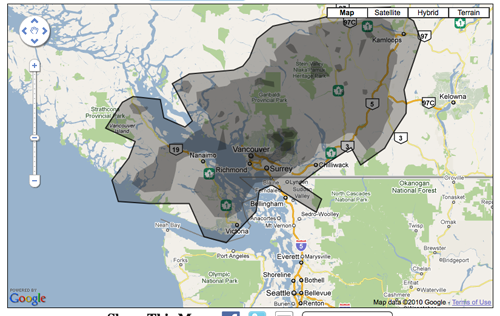 [/media-credit]
[/media-credit]
Bear in mind that this was the size of the spill 10 days ago, so it has grown since. You can “try the oil spill on” in different parts of the world by following this link: http://www.ifitwasmyhome.com/
For more links and to view Robert Scales’ slide presentation, please visit SlideShare.
After all the panelists presented and the crowd took a bit of a break, we all reconvened for an open discussion. The main ideas that were shared were that we, as a people, need to make a shift from a “consumer” role to a “citizen” role.
The way we are generally speaking about our government is from an “us” and “them” perspective. What we are not taking advantage of is the fact that we have a democratic government. With that came the question, “What is a democratic government?” and one answer was “majority rules.” But in fact a democratic government is a government “by the people.” Meaning in essence that, “we are the government!” So if this is the case, why are we, as a people, not exercising this? We are letting “them” make all the decisions, when in fact we DO have a say in what “they” decide!
So what it comes down to is that we are constantly complaining about things within our government, but not enough people are stepping up to do something about it. We all sit in our armchairs or at our computers, reading or watching the news, shaking our heads, but if we do not deem certain things unacceptable, they will never change! So what do we need to do? Well, we need to REDEFINE the acceptable!
And with that, the discussion was wrapped up, but it definitely inspired more thinking about these ideas for, I think, most of the people in the room. I know it did for me!
*Robert Scales stood in for Kris Krug of Static Photography, who was unable to present at the event due to an invitation to head to New Orleans and the Gulf of Mexico to photograph the environmental effects of the BP oil spill. More information about Kris’s expedition can be found at http://tedxoilspill.com/expedition/.
**Photography exhibit on the walls of the venue was “Studies In Sea Ice” by Roberta Holden of No Barriers Photography, and will be available for viewing until October 3, 2010.
***More photos from the event are available on Flickr.
